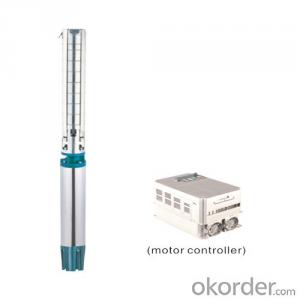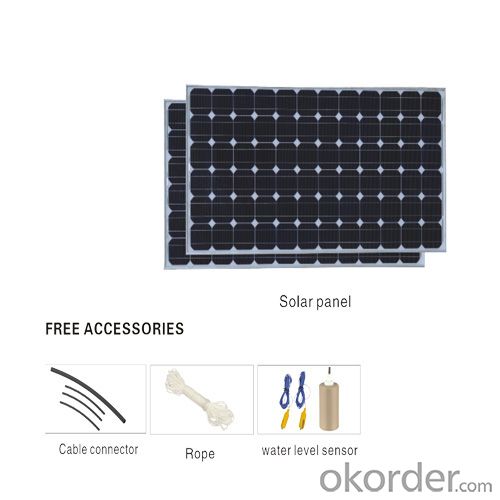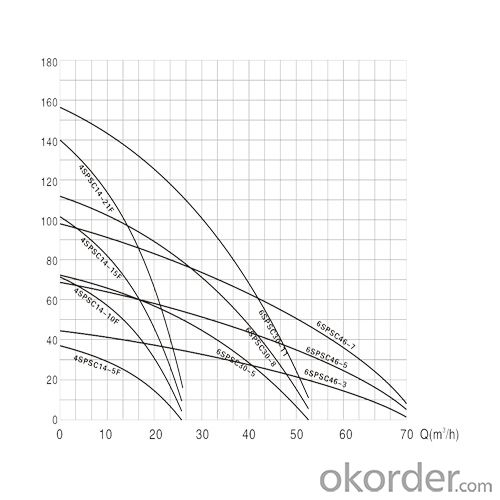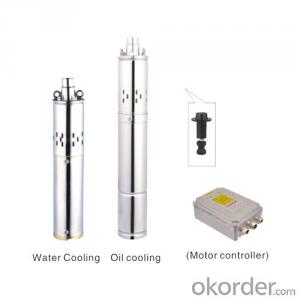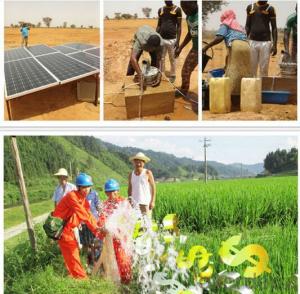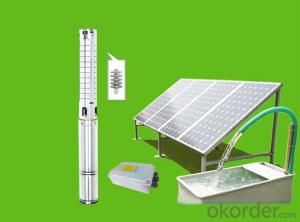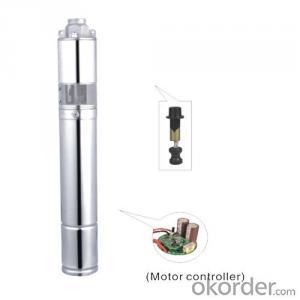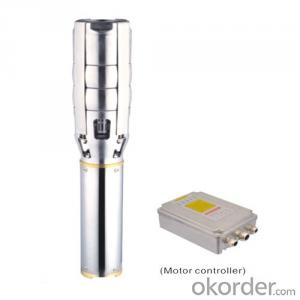Hybrid Solar Pump 4spsc 6spsc for Easy Install Wells with CE Certification
- Loading Port:
- Ningbo
- Payment Terms:
- TT OR LC
- Min Order Qty:
- 10 unit
- Supply Capability:
- 100000 unit/month
OKorder Service Pledge
OKorder Financial Service
You Might Also Like
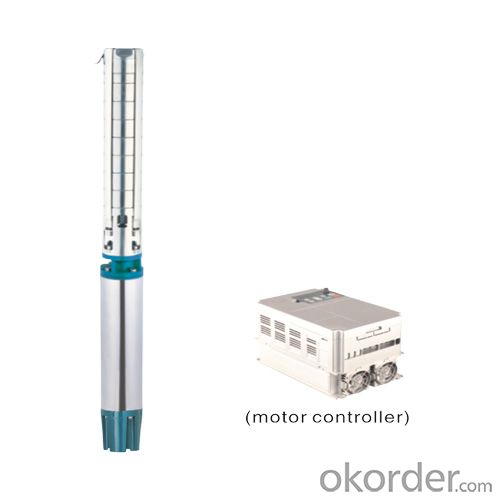
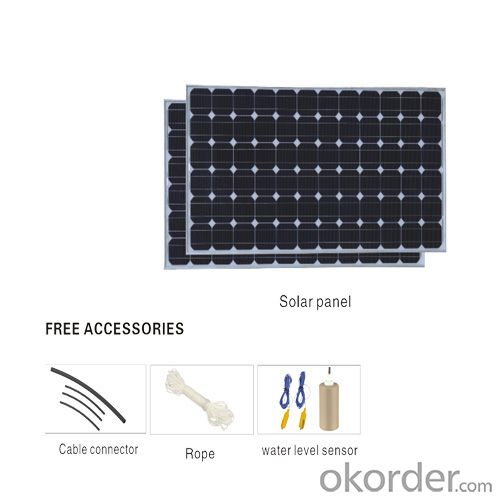
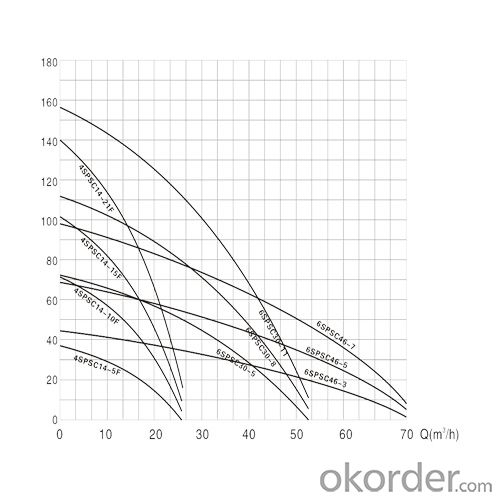
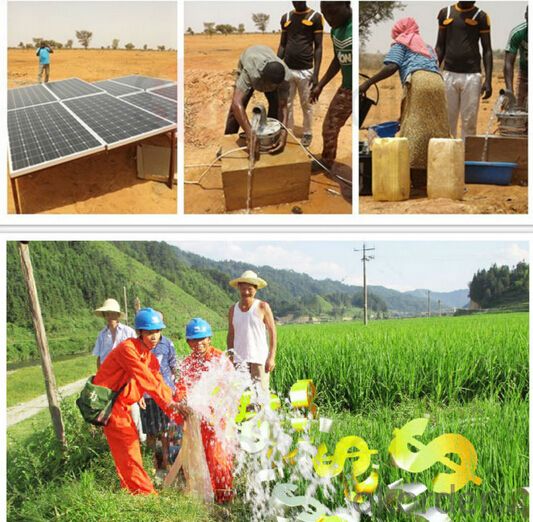
• IDENTIFICATION CODE
6SPSC30-8 6:well diameter. 6"
SPSC:Submersible pump model 3:capacity(m3/h)
8:stage
• FIFLDS OF APPLICATION
For water supply from wells or reservoirs
For domestic use,for civi and industral applications
For qarden use and imiqation
•technical data
Suitable fiuids:
Clean,free from solid or abrasive substances,
Chemically neutral and close to the characteristtics of water Performance:
Speed range: 2900rpm
Fluid temperature range: 0t;~40t;
Max.working pressure
Permissible up to:50 ℃
Voltage:
Three-phase: 380v~415v/50hz,60hz
Motor:
Degree of protection: IP68
Insulation class: B
motor data
Model | Impeller | Voltage | Power | Max.flow (m3/h) | Max.head (m) | OUTLET | Outer | Weight | MOQ |
4SPSC14-5F | 300 | 1.5 | 25 | 36 | 2" | 96-1005 | 21 | 1 | |
4SPSC14-7F | 300 | 2.2 | 25 | 52 | 2" | 96-1175 | 26 | 1 | |
4SPSC14-1 OF | 520 | 3 | 25 | 71 | 2" | 96-1480 | 30 | 1 | |
4SPSC14-13F | 520 | 4 | 25 | 91 | 2" | 96-1805 | 34 | 1 | |
4SPSC14-15F | 520 | 5.5 | 25 | 102 | 2" | 96-2025 | 38 | 1 | |
4SPSC14-18F | 520 | 5.5 | 25 | 125 | 2" | 96-2220 | 40 | 1 | |
4SPSC14-21 F | 520 | 7.5 | 25 | 140 | 2" | 96-2495 | 47 | 1 | |
4SPSC14-25F | 520 | 7.5 | 25 | 168 | 2" | 96-2755 | 50 | 1 | |
6SPSC30-5 | Centrifugal | 520 | 5.5 | 49 | 71 | 3'' | 138-1286 | 62 | 1 |
6SPSC30-7 | (Plastic) | 520 | 7.5 | 49 | 100 | 3'' | 138-1444 | 67 | 1 |
6SPSC30-8 | 520 | 7.5 | 49 | 114 | 3'' | 138-1478 | 68 | 1 | |
6SPSC30-9 | 520 | 9.2 | 49 | 129 | 3'' | 138-1602 | 72 | 1 | |
6SPSC30-11 | 520 | 11 | 49 | 157 | 3'' | 138-1779 | 81 | 1 | |
6SPSC46-2 | 520 | 4 | 68 | 29 | 4" | 138-1056 | 52 | 1 | |
6SPSC46-3 | 520 | 5.5 | 68 | 44 | 4" | 138-1286 | 57 | 1 | |
6SPSC46-4 | 520 | 7.5 | 68 | 58 | 4" | 138-1444 | 62 | 1 | |
6SPSC46-5 | 520 | 7.5 | 68 | 69 | 4" | 138-1478 | 67 | 1 | |
6SPSC46-6 | 520 | 9.2 | 68 | 83 | 4" | 138-1602 | 68 | 1 | |
6SPSC46-7 | 520 | 11 | 68 | 93 | 4" | 138-1779 | 72 | 1 |
Product Description
Product Feature
Solar submersible pumps is the efficient equipment to extract groundwater in applications of agricultural irrigation, human and livestock water in plateau and mountain areas, etc.
1. Motor and shell made of stainless steel
2. Stainless steel shaft and coupling
3. High strength & wear resistance stainless steel impeller and diversion shell
4. Sand resistance, anti-rust, pollution-free, long life time
5. Small size, light and easy to ship
6. Easy installation and easy maintain
7. High efficient smart controller with multiple protections: over-temperature protection,
short-current protection, over-load and under-voltage protection. Safe and reliable to use.
Price includes pump with controller. Solar PV panels may be purchased separately.
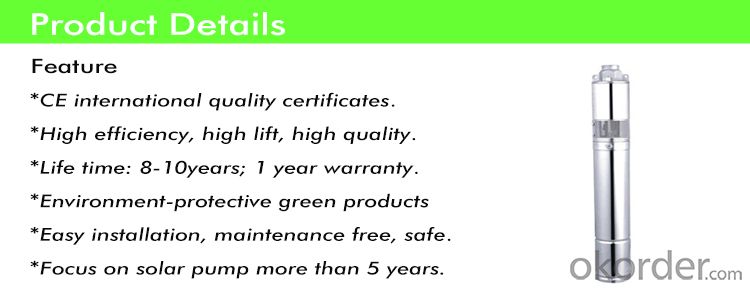
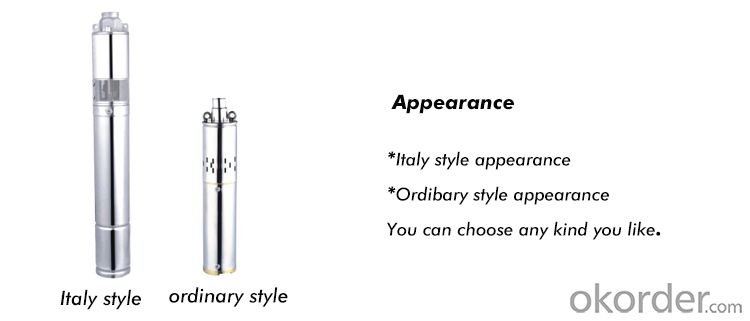




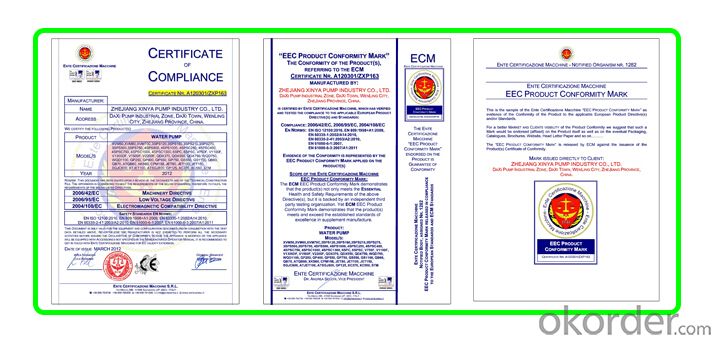
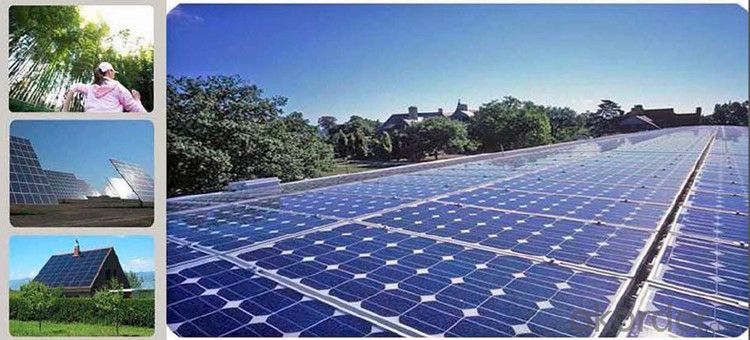
CNBMSOLAR is a world-leading and Vertical integrated manufacturer of high-performance with Silicon, Wafer, Cells,
Modules, which convert sunlight into electricity for residential, commercial, and utility-scale power generation.
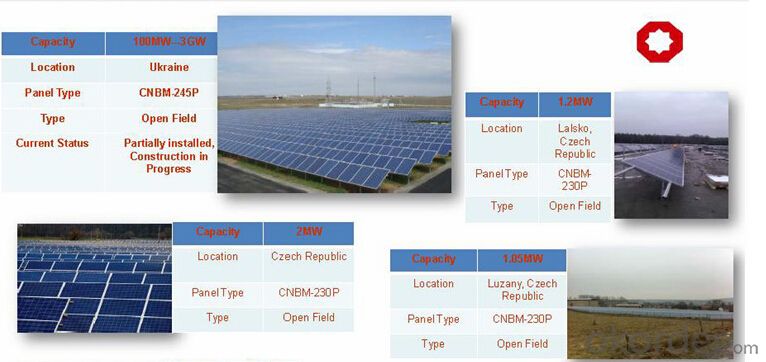
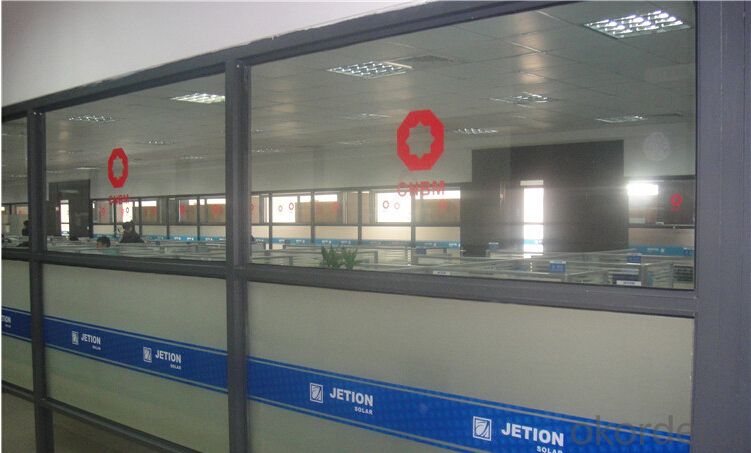
FAQ
Q1. When can I get the quotation?
We usually quote within 24 hours after we get your inquiry. If you are urgent to get the price, please send the message on trade manager or call us directly.
Q2. Can I buy one as sample?
Yes, of course. MOQ of solar pump is 1 piece. For the other kind of products (water pump, air compressor and welding machine), you need to pay all the fee when we make the sample.
Q3. Can you make OEM?
Yes, you can put your logo and brand on the box.
Q4. What is your main market?
Eastern Europe, Southeast Asia. Mid East, South America, Northern Europe.
- Q: Can a solar pump be used for water supply in wildlife sanctuaries or conservation areas?
- Yes, a solar pump can be used for water supply in wildlife sanctuaries or conservation areas. Solar pumps are a sustainable and eco-friendly alternative to traditional pumps that rely on fossil fuels or electricity from the grid. They harness solar energy to power the pump, allowing for a constant and reliable water supply without harming the environment or disrupting the natural habitat of the wildlife. Solar pumps can be installed in remote or off-grid areas, making them ideal for wildlife sanctuaries or conservation areas that may not have access to traditional sources of electricity. Additionally, solar pumps require minimal maintenance and have a long lifespan, making them a cost-effective and efficient solution for providing water to wildlife in these protected areas.
- Q: How does a solar pump handle water with high levels of color or turbidity?
- A solar pump can handle water with high levels of color or turbidity by using a filtration system. The pump typically includes filters that can remove particles and impurities from the water, allowing it to be pumped efficiently. These filters can effectively handle color or turbidity in the water, ensuring that the pump works optimally and delivers clean water for various purposes.
- Q: What is the typical efficiency rating of a solar pump system?
- The typical efficiency rating of a solar pump system can vary depending on several factors. Generally, solar pump systems have an efficiency rating ranging from 15% to 30%. This means that they can convert around 15% to 30% of the solar energy they receive into mechanical or electrical energy to power the pump. However, it is important to note that the efficiency rating can be influenced by various factors such as the type and quality of solar panels used, the size and design of the pump system, the location and climate conditions, and the overall system setup. Additionally, the efficiency of a solar pump system may also be affected by maintenance practices, such as keeping the solar panels clean and free from shading, ensuring proper alignment with the sun, and regular monitoring of the system's performance. Ultimately, it is crucial to consider these factors and consult with professionals or manufacturers to determine the specific efficiency rating of a particular solar pump system based on its design, components, and operating conditions.
- Q: How does a solar pump handle water source contamination from chemical spills?
- A solar pump does not have the ability to directly handle water source contamination from chemical spills. However, it can be used to pump water from unaffected sources or be combined with appropriate water treatment systems to remove contaminants before use.
- Q: Can a solar pump be used in areas prone to lightning strikes?
- Yes, a solar pump can be used in areas prone to lightning strikes. Solar pumps are generally safe to use during lightning storms because they operate on low voltage and do not rely on grid power. However, it is still recommended to use surge protectors and grounding systems to minimize the risk of damage from lightning strikes.
- Q: Can a solar pump be used for water supply in remote military bases?
- Yes, a solar pump can be used for water supply in remote military bases. Solar pumps are a reliable and sustainable solution, as they utilize solar energy to power the pump and draw water from sources such as wells, rivers, or lakes. They can operate in remote areas without the need for a grid connection or fuel supply, making them ideal for providing water supply in military bases located far from urban infrastructure. Additionally, solar pumps are low-maintenance and cost-effective, contributing to the overall efficiency and resilience of water supply systems in remote military bases.
- Q: Are there any limitations to the size of the water reservoir that a solar pump can fill?
- Yes, there are limitations to the size of the water reservoir that a solar pump can fill. The size of the reservoir is limited by the capacity of the solar pump and the amount of sunlight available to power it. If the pump is not powerful enough or if there is limited sunlight, it may not be able to fill a large reservoir efficiently or at all. Additionally, factors such as the distance between the pump and the reservoir, the elevation, and the presence of any obstacles can also affect the pump's ability to fill a larger reservoir.
- Q: Can a solar pump be used in areas with limited access to water treatment facilities?
- Yes, a solar pump can be used in areas with limited access to water treatment facilities. Solar pumps are particularly beneficial in remote or off-grid locations where there may be limited infrastructure for water treatment. They can draw water from natural sources such as wells, rivers, or lakes and provide a sustainable solution for accessing clean water without relying on traditional water treatment facilities. Additionally, solar pumps are environmentally friendly and cost-effective, making them well-suited for areas with limited resources or infrastructure.
- Q: Can solar pumps work at night or on cloudy days?
- No, solar pumps rely on sunlight to generate power, so they do not work at night or on cloudy days when there is limited or no sunlight available.
- Q: How does a solar pump handle water with high levels of sulfur?
- A solar pump can handle water with high levels of sulfur by utilizing a specialized filtration system. This filtration system is designed to remove sulfur and other contaminants from the water before it is pumped. Additionally, the solar pump's motor and components are made of corrosion-resistant materials that can withstand exposure to sulfur and prevent damage.
Send your message to us
Hybrid Solar Pump 4spsc 6spsc for Easy Install Wells with CE Certification
- Loading Port:
- Ningbo
- Payment Terms:
- TT OR LC
- Min Order Qty:
- 10 unit
- Supply Capability:
- 100000 unit/month
OKorder Service Pledge
OKorder Financial Service
Similar products
Hot products
Hot Searches
Related keywords
